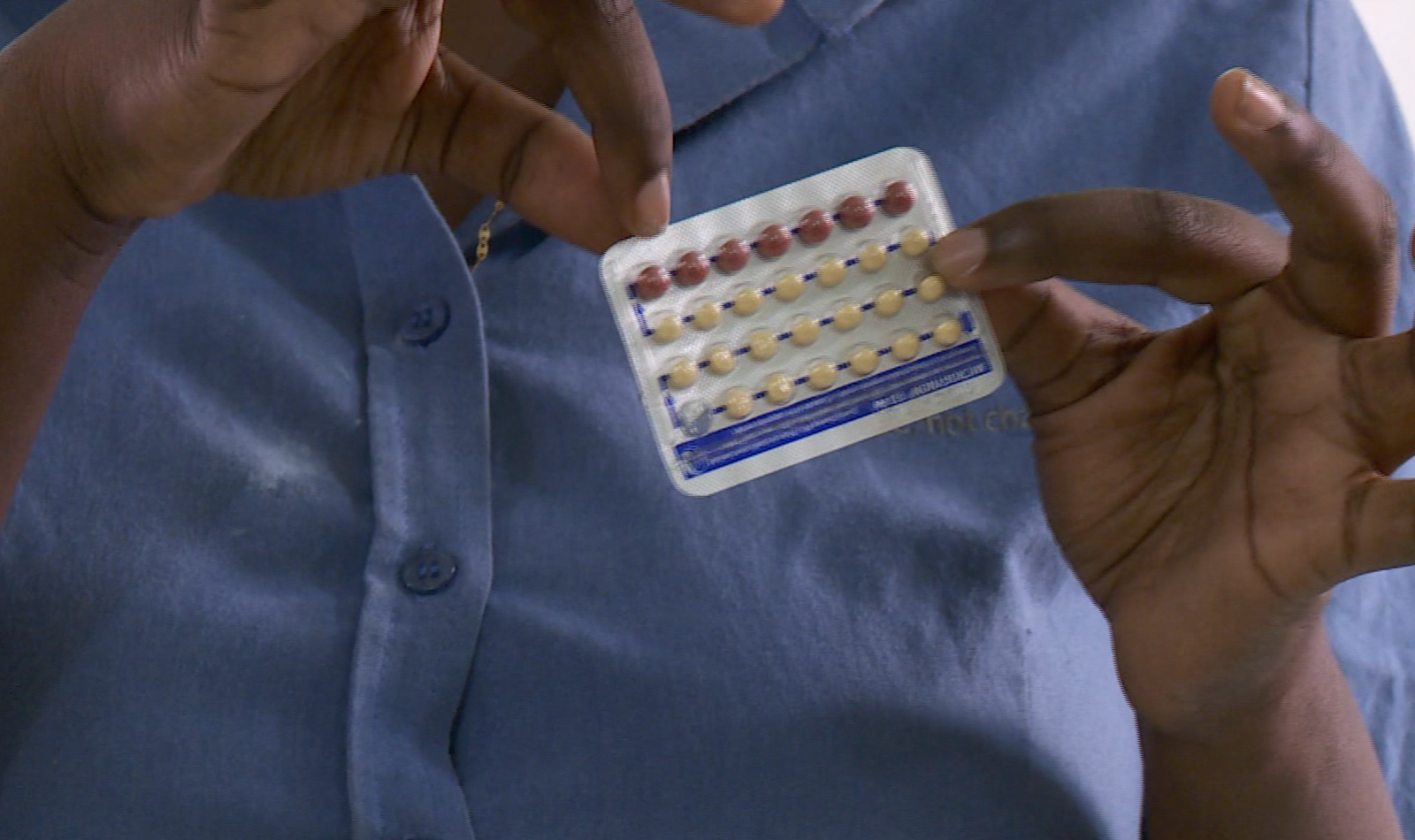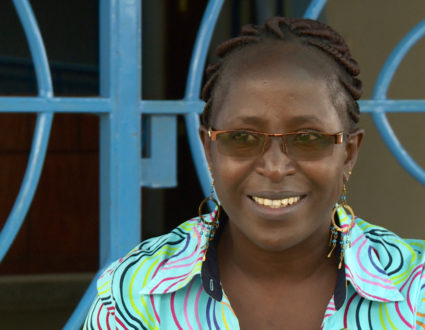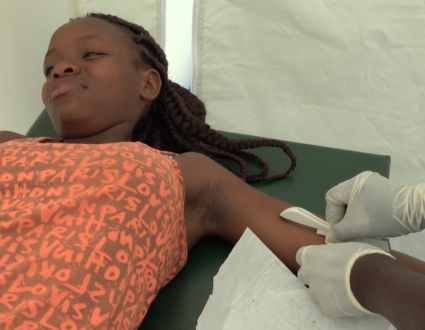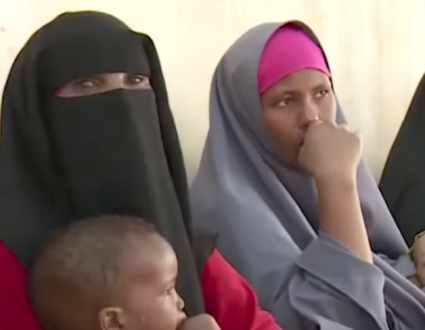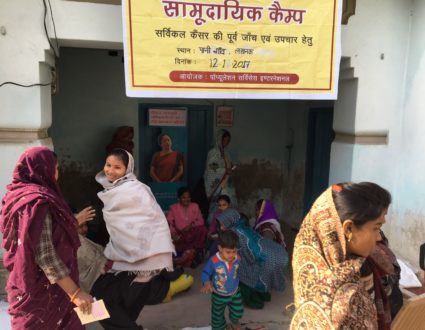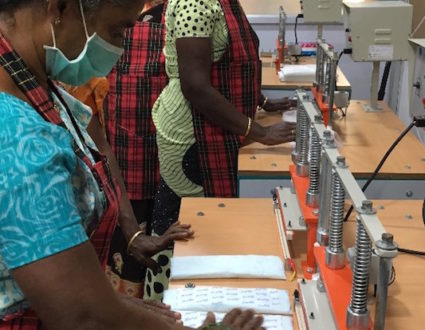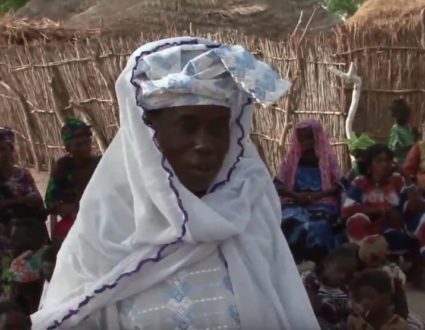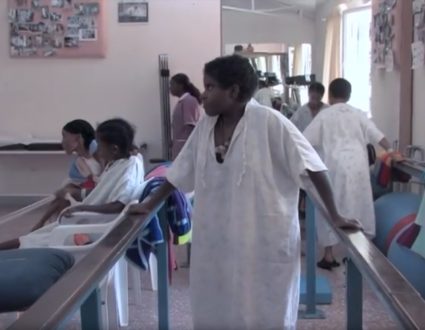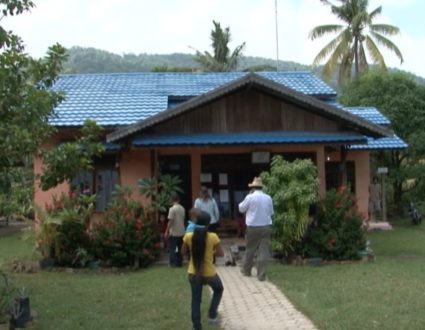Judy Woodruff:
But first, an echo from Africa, where the effects of the long-running debate in U.S. politics over abortion are felt.
Special correspondent Fred de Sam Lazaro reports from Kenya on a policy governing foreign aid for health care services.
Fred De Sam Lazaro:
Mix music, dancing and games and you’re sure to attract a crowd of young people in poor neighborhoods like this one in Eldoret, Kenya.
But behind the festivities is a serious mission- providing teens with information about and help with birth control. In a nearby tent, health workers offer contraception for anyone that requests it. The preferred method? Injectables, which can stave off pregnancy for up to four years.
It’s all sponsored by Marie Stopes International, a British-based health care charity that works in 37 developing countries.
Aid agencies that provide reproductive health services say this work is critical to curb some of the world’s fastest population growth rates. Kenya, for example, is not the fastest in Africa, but its population has more than doubled over the past 25 years.
Marie Stopes had received about $30 million annually worldwide from the U.S. government to do its work, but all of that was cut last January when President Trump reinstated the so-called Mexico City rule, which its critics call the global gag rule.
The Reagan administration instituted the policy in 1984, following a Mexico City conference. It cuts off U.S. government aid for abortion services to groups that provide or even mention abortion as an option. The rule has since been rescinded by every Democratic administration and reinstated by every Republican one.
But the Trump administration has gone much further, applying the rule to an organization’s entire U.S. aid grant, not just money for reproductive healthcare. Aid groups that might have forfeited $600 million annually under the previous restrictions now risk losing $9 billion.
Dana Tilson is Kenya director for Marie Stopes International.
Dana Tilson:
It’s the whole range of health care services that’s affected by this. It’s HIV. It’s malaria. It’s cervical cancer, tuberculosis. So, the impact globally is massive.
Marjorie Dannenfelser:
Not one penny will be taken away, not one penny less will be spent in Africa to be devoted to health care across the board.
Fred De Sam Lazaro:
Marjorie Dannenfelser, who advised President Trump on the new policy, insists it doesn’t take away any funds, as long as aid groups stop abortion services.
Marjorie Dannenfelser:
The only thing Marie Stopes has to do is come into compliance with the policy, if they actually proved that they were focused on the health of all people, including the unborn child in Africa. And you know what? I would support that. I would support any amount of funding if they would take away their abortion services.
Fred De Sam Lazaro:
That’s a nonstarter for Marie Stopes. Even though abortions are legal in Kenya only if they endanger the mother’s life, and amount to just 10 percent of Marie Stopes’ work, Tilson says the group won’t curtail those services because of U.S. politics.
Dana Tilson:
We believe that women have a right to comprehensive health care, including comprehensive reproductive health care. And family planning and safe abortion services are an essential component of that comprehensive health care package.
Fred De Sam Lazaro:
In fact, Tilson says about 40 percent of the work that Marie Stopes does is aimed at preventing unwanted pregnancies in the first place. We watched one of the weekly classes held in Nairobi, designed to educate both men and women about family planning.
Afterwards, we spoke to women who already have children, but don’t want anymore.
Linet Muhonja (through Interpreter):
The economy is very harsh these days. And if you have many children, it is expensive to care for them with shelter, food and education.
Magdalene Wambua (through Interpreter):
I want to give my children the best environment I can, so they will do well in the future. But it’s expensive.
Fred De Sam Lazaro:
So far, Marie Stopes has been able to continue offering family planning services for free by getting some emergency funding from a coalition of European governments and organizations.
That funding, however, will run out in mid-2018. Meanwhile, the impact of the new rule is already being felt by smaller groups, like Family Health Options of Kenya. It shut down one of it’s medical clinics and has curtailed many outreach activities.
Clinic director Melvine Ouyo says they have also had to start charging for services that used to be free, which drives patients away.
What do you think would be the consequence in health terms?
Melvine Ouyo:
We will see an increased number of mortalities from other ailments, because people are not able to access the services currently.
Fred De Sam Lazaro:
Ouyo says it’s also likely to mean an upswing in unintended pregnancies.
Patient Elizabeth Wanjiru still manages to come to one of the still open clinics for contraceptives, but says many of her friends can’t afford it.
Elizabeth Wanjiru:
They’re not using family planning. And if they’re not using family planning, they end up having baby, unwanted pregnancy.
Fred De Sam Lazaro:
Critics say there’s a stark irony in all this. A Stanford University study of the policy during the George W. Bush administration found abortion rates actually rose when money for family planning was cut off. The consequence? Higher maternal mortality rates, says Tilson.
Dana Tilson:
Where women have unintended and unwanted pregnancies, they will do anything to terminate the pregnancy. Where there are not safe services available, they will go to the backstreets.
Fred De Sam Lazaro:
Abortion is only a small part of what you do, but in deference to the danger that you face, why not swallow hard?
Dana Tilson:
The reason is rights and principles. And, yes, women and girls will lose their lives because of this gag rule, but we’re not going to be gagged.
Fred De Sam Lazaro:
For her part, Trump adviser Dannenfelser says the Mexico City rule is also based on principle.
Marjorie Dannenfelser:
The Trump administration, and most of America, doesn’t believe that taxpayer funding ought to go to abortion. And it certainly shouldn’t go to nations that generally are very, very pro-life, which is true all across Africa.
The cultural imperialism that exists at the heart of this idea, that they can’t be happy unless they have abortion like we do, is outrageous.
Fred De Sam Lazaro:
She insists new aid groups will step up to offer critical health services that larger ones like Marie Stopes may no longer provide.
But critics doubt any newcomers would have that capacity. At stake are health services to tens of millions of people who depend on the largest single humanitarian aid program in the world.
For the PBS NewsHour, this is Fred de Sam Lazaro in Nairobi, Kenya.
Judy Woodruff:
Fred’s reporting is a partnership with the Under-Told Stories Project at the University of St. Thomas in Minnesota.
A Global Gag
The so-called global gag rule, which cuts off some U.S. government aid to health agencies that offer or mention abortion services, has been reinstated by every Republican president going back to Reagan. But the Trump administration has gone much further, cutting all funding to groups that offer vital health care services in places like Kenya. Special correspondent Fred de Sam Lazaro has the story.
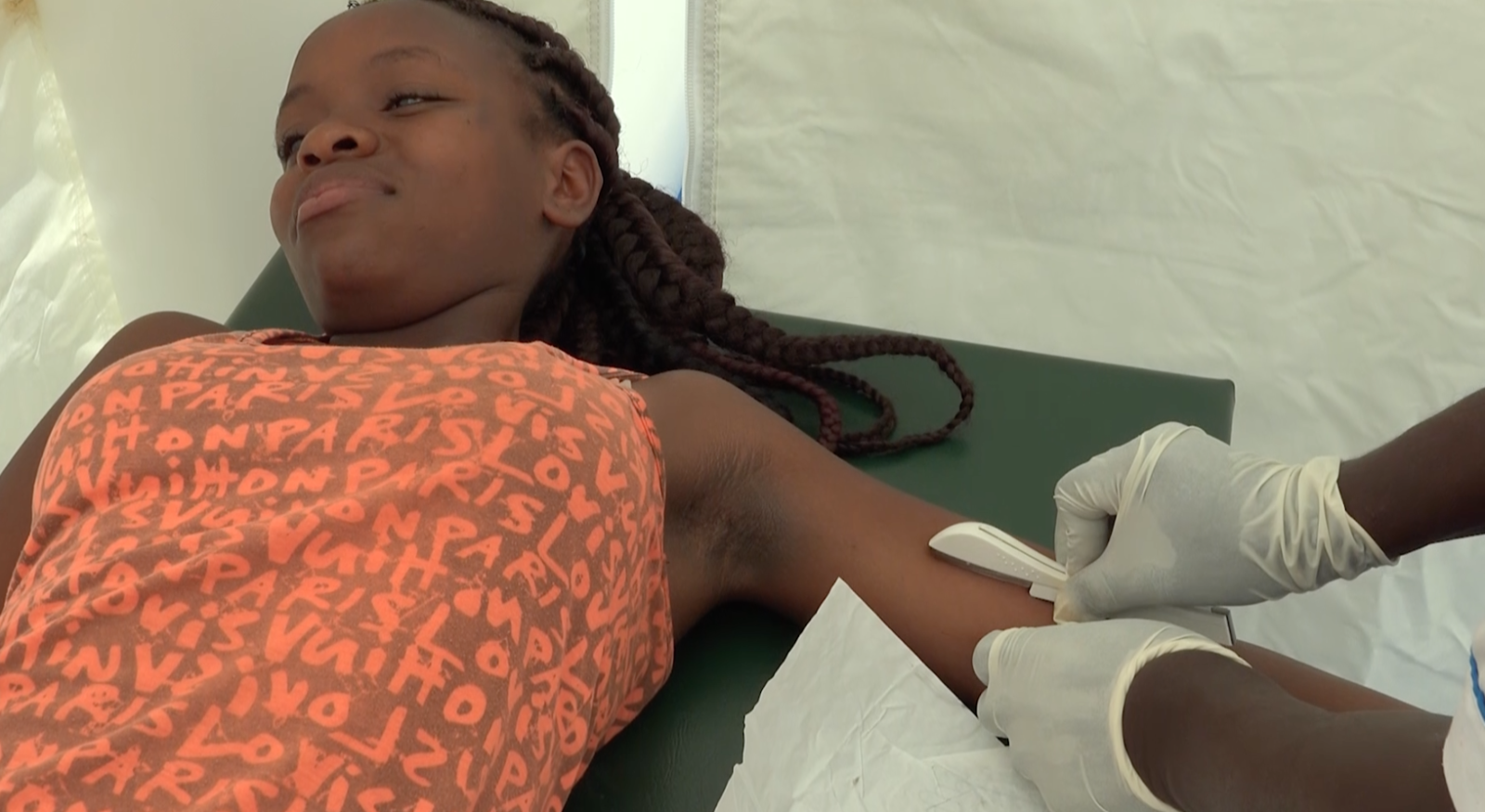
What is the Mexico City “Gag” Rule?
The Reagan administration instituted the policy in 1984 which cuts off U.S. government aid for abortion services to groups that provide or even mention abortion as an option
the rule to an organization’s entire U.S. aid grant, not just money for reproductive healthcare. Aid groups that might have forfeited $600 million annually under the previous restrictions now risk losing $9 billion.
Point of View
“It’s the whole range of health care services that’s affected by this. It’s HIV. It’s malaria. It’s cervical cancer, tuberculosis. So, the impact globally is massive. … We believe that women have a right to comprehensive health care, including comprehensive reproductive health care. And family planning and safe abortion services are an essential component of that comprehensive health care package.”
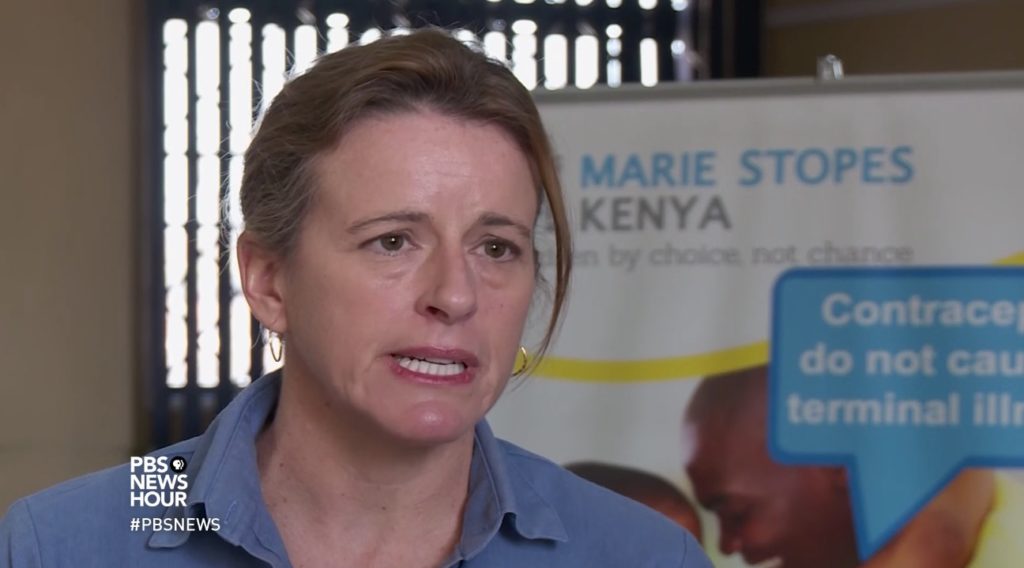
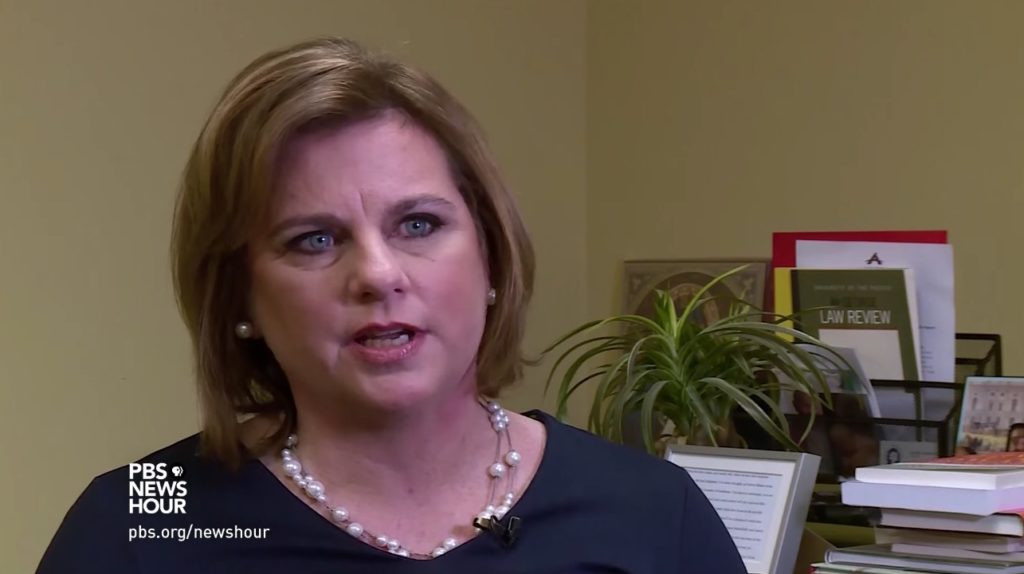
Point of View
“The only thing Marie Stopes has to do is come into compliance with the policy, if they actually proved that they were focused on the health of all people, including the unborn child in Africa. And you know what? I would support that. I would support any amount of funding if they would take away their abortion services.”
